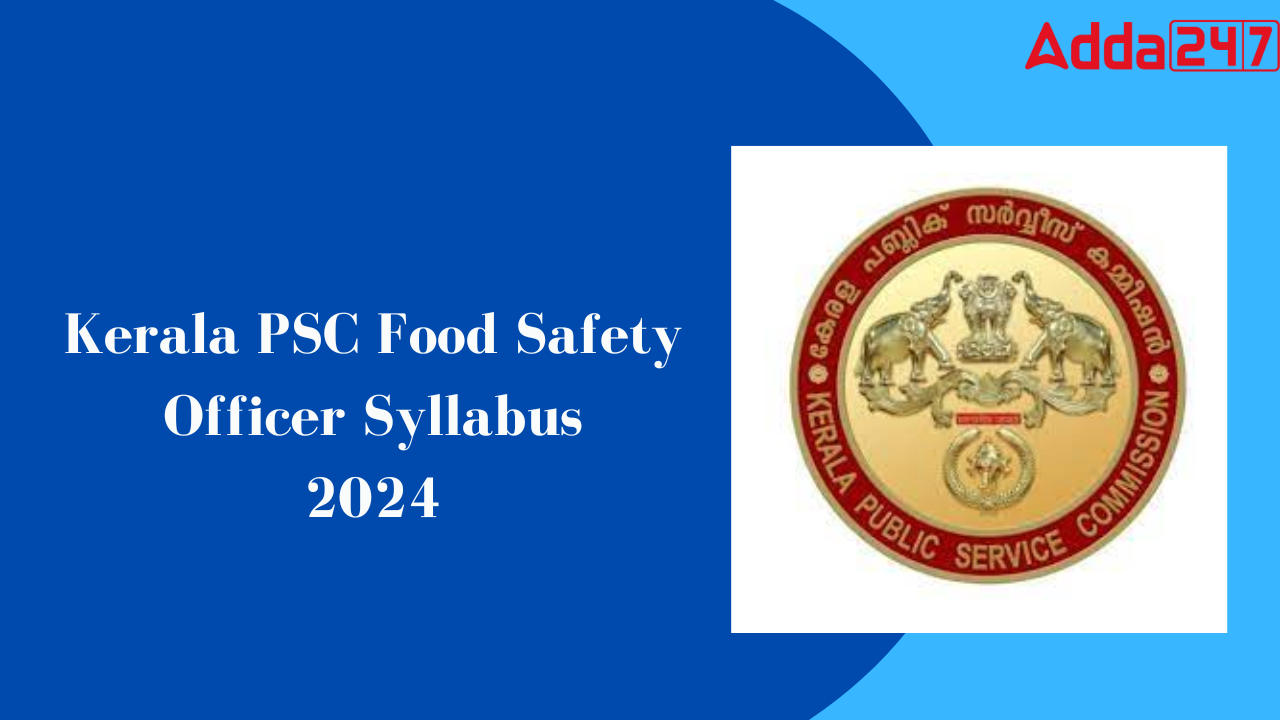Table of Contents
Kerala Public service Commission has released the Food Safety Officer Exam Syllabus on the official website. Candidates who applied for the Kerala PSC Food Safety Officer Exam should check the official syllabus and preapre according to the topics mentioned in it. The Kerala PSC Food Safety Officer Syllabus 2024 helps candidates to focus on the topics that are important for the exam. Here, we have shared the latest Kerala PSC Food Safety Officer Exam Pattern and Syllabus 2024.
Kerala PSC Food Safety Officer Syllabus 2024
Recently the Kerala Public Service Commission released the Kerala PSC Food Safety Officer Notification 2024 on the official website of KPSC at www.keralapsc.gov.in. Candidates should start their preparation for the exam now with the help of the KPSC Food Safety Officer Syllabus 2024. Candidates have to read the syllabus properly to understand the syllabus and score good marks in the exam. Download the Food Safety Officer Syllabus in PDF format from the official website or use the provided link in the article below.
KPSC Food Safety Officer Syllabus 2024
The Kerala PSC Food Safety Officer Exam is a state-level exam where thousands of candidates are going to appear in this exam for the post of Food Safety Officer in Kerala PSC. The syllabus is provided in this article. For more details use the table below.
| KPSC Food Safety Officer Syllabus 2024 | |
|---|---|
| Organization | Kerala Public Service Commission |
| Category | Exam Syllabus |
| Dept. | Food Safety |
| Post Name | Food Safety Officer |
| Category no | 006/2024 |
| Exam mode | OMR |
| Medium of questions | English |
| Mark | 100 |
| Exam Duration | 1 hour 30 minutes |
| Official website | www.keralapsc.gov.in |
Kerala PSC Food Safety Officer Exam Pattern 2024
Candidates have to know about the Kerala PSC Food Safety Officer Exam Pattern 2024. The exam pattern will help candidates to know about the marks distribution, negative marking, and the time duration that will be provided to candidates to complete the exam.
- The Kerala PSC Food Safety Officer Exam 2024 will be objective types and multiple choice questions.
- There will be 100 total questions present in the question paper.
- Candidates will get 1 mark for every correct answer.
- The negative mark for every incorrect answer will be 0.33 marks.
- The time duration provided to the candidates will be 1 hour 30 minutes.
| Kerala PSC Food Safety Officer Exam Pattern 2024 | |||
| Sl.No | Subjects | Marks | Duration |
| 1 | Food Technology | 20 | 1Hour 30 Minutes |
| 2 | Dairy Science | 20 | |
| 3 | Veterinary Sciences | 20 | |
| 4 | Nutritional Biochemistry and Food Analysis | 20 | |
| 5 | Microbiological, Biotechnological, and Medical Aspects | 20 | |
| Total | 100 | ||
Kerala PSC Food Safety Officer Syllabus 2024 Download PDF
The Kerala PSC Food Safety Officer Syllabus 2024 PDF will be available on the official website. The Official Kerala PSC Food Safety Officer Syllabus helps candidates to gather relevant study materials and focus on the topics which are most important for the exam. Candidates can visit the official website or they can click on the link which is provided below to download their Kerala PSC Food Safety Officer Syllabus 2024 PDF.
Kerala PSC Food Safety Officer Syllabus 2024 Download PDF
Kerala PSC Food Safety Officer Syllabus 2024
In the below article, we have provided the Kerala PSC Food Safety Officer syllabus for the Kerala PSC Food Safety Officer Exam 2024. Candidates can check the syllabus which will help them start their preparation for the upcoming exam.
| Kerala PSC Food Safety Officer Syllabus 2024 | |
| Food Technology | Principles and methods of food preservation – Heat processing, pasteurization, canning, dehydration, freezing, freeze drying, fermentation, microwave, irradiation, and chemical preservatives – Aseptic preservation, hurdle technology, hydrostatic pressure technology, microwave processing, microfiltration, bactofugation, ultra-high voltage electric fields, pulse electric fields, high-pressure processing, irradiation, thermosensation, ohmic heating, dielectric heating, infrared, induction heating, antibacterial and bacteriocins. Food fortification. Food additives. Classification, composition, manufacture, packaging, storage and defects of tomato products, other convenience foods from fruits and vegetables, beverages – tea, cocoa, and coffee – pickles, chutney, sauces, spices, jam, Jelley, marmalade, health drinks, restructured fruits and vegetables, preparation of fruits and vegetables, minimally processed products and Individually Quick Frozen products. Milling, processing, composition, structure, product development, and byproduct utilization of cereals, pulses, millets, and oil seeds. Antinutritional factors. Instant ready mixes. Packaging – materials and methods. Nutritional labeling of food. Quality control – systems and tools. Food plant sanitation. Food hygiene. Environment and waste management. Total quality management, good management practices, HACCP, and codex alimentarius commission. |
| Dairy Technology | Composition of milk- Physicochemical properties of milk- milk hygiene- milk microbiology – Market milk: a collection of milk- cooling and transportation– filtration/clarification- standardization- homogenization – pasteurization- UHT – sterilization- packaging. Tests for milk quality and detection of adulterants- dairy plant and equipment hygiene and sanitation. Definition, classification, composition, outline of manufacture, packaging, storage, and defects of the following milk products: Cream, Malai, Dahi /Curd, yogurt, Channa / Paneer, Cheese, Ice cream, Frozen desserts, Evaporated milk, Condensed milk, Milk powder, Butter, Ghee, Chakka and Shrikhand, Indigenous milk products. Foods for infant nutrition. Whey products, Edible casein products. |
| Veterinary Sciences | Standards for organization and layout of abattoirs, handling and transport of meat animals including poultry. Ante mortem and post mortem examination. Scientific slaughtering and dressing of carcasses. Evaluation, grading, and fabrication of dressed carcasses including poultry. Fraudulent substitution of meat, preservation of meat, and aquatic foods. Ageing of meat. Packaging of meat and meat products. Physico-chemical and microbiological quality of meat and aquatic food and food products. Organic meat food products. Food products of genetically modified animals and marine origin. Meat as a source of disease transmission. Physical, chemical nutritional, and functional characteristics of egg. Processing of Egg and egg products. Preservation and storage of eggs. |
| Nutritional Biochemistry and Food Analysis | Chemical composition of food: Carbohydrates, lipids, proteins, fiber, vitamins, and minerals – characteristics, sources, physiological and biochemical functions, daily requirements, digestion, and absorption. Biological value of proteins (BV), Protein efficiency ratio (PER), Digestability coefficient, Net Protein Utilization, Net Protein Ratio(NPR), Chemical Score, Free Radicals, and Antioxidants. Energy value of foods, Respiratory Quotient (RQ), Determination of Basal Metabolic Rate (BMR), Determination of energy metabolism during work, Energy expenditure for various types of activities, Recommended Daily Allowance (RDA), Specific Dynamic Action (SDA) of foods, Balanced diet formulation. Analytical techniques used in the detection of adulteration of food: Principle, procedure, and detectors of chromatographic techniques (Column, paper, TLC, HPLC, and GC), Spectroscopic techniques (IR, UV, MS, and AAS). Food Analysis – moisture content, ash, fat, carbohydrate, crude fiber, crude protein, sodium, potassium, calcium, and phosphates. Food adulteration: common adulteration, contamination, and pesticide analysis. Oils and Fats – Iodine value and saponification value. |
| Microbiological, Biotechnological, and Medical Aspects | Microscopy, staining and culture techniques, sterilization techniques, culture media, factors influencing microbial growth, growth curve, thermal death time and thermal death points, D-value, Z- value. Sources of microorganisms in food, perishable, semi-perishable and non-perishable foods, intrinsic and extrinsic parameters influencing microbial content of food, Food spoilage types, causes, and indications. Control of spoilage-pre-harvesting and post-harvesting food processing. Food Borne Diseases: Definition, Classification (Foodborne intoxications & Foodborne infections), neurolathyrism, aflatoxins, Ergotism, Epidemic dropsy, Typhoid fever, Salmonellosis, Staphylococcal intoxication, Botulism, Bacillus cereus food poisoning, E.coli diarrhoea, Cholera, Shigellosis, Brucellosis, Food poisoning: Types of food poisoning, method of investigation of food poisoning, prevention, and control- food sanitation, refrigeration, surveillance. Food handlers: medical examination of food handlers, infections transmitted by food handlers, education of food handlers. Adulteration of foods: Health hazards. Sanitation of eating places: minimum standards, storage of uncooked foodstuffs, waste disposal, water supply, and washing facilities. Fermented foods- types, production, organisms involved, advantages and disadvantages, spoilage of fermented foods. Microbiological analysis of food and water- qualitative and quantitative, indicator organisms, coliforms, detection of pathogens, molecular techniques for detection of microbes. Microbiological standards of food and water. Water purification for domestic and municipal purposes. Sewage treatment. Application of enzymes in the food industry, production of food flavour and colour. Enzyme immobilization and applications. Use of amylase, invertase, protease, pectinase, and cellulase in food industries. Bioreactors. Single-Cell Proteins. Molecular detection of food contamination. Genetically modified food and its labelling. |
| Also Check |
| Kerala PSC Food Safety Officer Previous Year Question Paper |




 Kerala PSC Industries Extension Officer ...
Kerala PSC Industries Extension Officer ...
 Kerala PSC Staff Nurse Grade - II Previ...
Kerala PSC Staff Nurse Grade - II Previ...
 Kerala PSC Field Assistant Previous Year...
Kerala PSC Field Assistant Previous Year...


 Adda247 Job portal has complete information about all Sarkari Jobs and Naukri Alerts, its latest recruitment notifications, from all state and national level jobs and their updates.
Adda247 Job portal has complete information about all Sarkari Jobs and Naukri Alerts, its latest recruitment notifications, from all state and national level jobs and their updates.